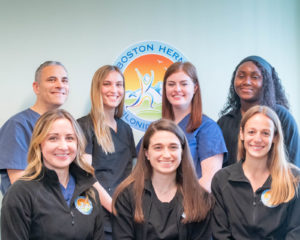Diagnosing an inguinal hernia is critical to learn the best course of treatment for your hernia repair. After an initial set of questions about medical history, pain, activities and diet, a qualified hernia specialist can usually diagnose an inguinal hernia through a physical exam. A specialist is often a trained surgeon or their physician assistant.
- Medical history: The doctor will ask questions about symptoms of a hernia, general lifestyle and diet, what caused the patient to come in for an evaluation now
- Symptoms: Almost every patient with a hernia notices a bulge or lump that comes and goes. The bulge can be painless, mildly uncomfortable, or interfere with activities. Symptoms typically improve when lying down in bed or resting. Prolonged standing or sitting can make things worse as well. Any discomfort is rarely ever sharp, and while hernias can occur as a result of an injury, pain after an injury, without a bulge, is often a core muscle injury and not a hernia.
- Physical exam: The doctor will look for a bulge in the groin area and ask the patient to stand and cough or strain. Standing and coughing can make a hernia more obvious. They will also examine your abdomen lying down to evaluate the hernia and determine the best repair options.
Physical Examination
Following initial diagnosis and during the physical examination, your specialist will likely:
- Inspect the groin area for a bulge
- Palpate (feel) the area to assess the size and location of the hernia
- Ask you to strain (cough or bear down) to see if the bulge becomes more prominent
- Sometime lying down can help confirm the diagnosis of an inguinal hernia vs a femoral hernia
- In order to diagnose a groin strain, instead of, or in addition to an inguinal hernia, the specialist may have you contract various muscles of your legs or core
Inguinal hernias in men typically present themselves as a bulge in or near the groin area. Some men notice swelling next to the pubic bone, while others notice swelling in the scrotum, near the testicles. Read more about inguinal hernia diagnosis in men >>
There is no hard number that is consistently used to determine when patients can resume physical activity after hernia surgery. In fact, recent scientific data suggests that minimal down time is suggested during the hernia surgery recovery. Most patients can return to desk work in 1-3 days and resume normal exercise at 2 weeks. Read more about inguinal hernia recovery times >>
While everyone recovers from surgery differently, most of our patients experience minimal pain after hernia surgery. The majority of our patients do not take prescription pain medications at all! Read more about pain after hernia surgery >>

Imaging Tests
If diagnosis of the inguinal hernia is not clear to a hernia specialist, sometimes imaging can help. This occurs in less than 5% of patients:
- Ultrasound: A painless procedure that uses sound waves to create pictures of internal organs and tissues. Ultrasounds are the least invasive imaging test, but their accuracy depends on the examiner's skill and in our practice we find them to be less than helpful. Learn more why we sometimes recommend against having an ultrasound for hernia diagnosis
- CT scan: A CT scan can help detect other causes of groin masses, and is useful for diagnosing complicated hernias. This modality creates a multidimensional image for a specialist to evaluate previous hernia repairs, or anything unusual in the anatomy. Think of it as a GPS to be used prior to surgery
- MRI: In rare cases with a high sensitivity and specificity, MRIs are used to detect inguinal hernias, but these are expensive and rarely used as CT is a better test for hernia
Imaging should almost never be ordered prior to an evaluation by a hernia specialist. Patients who are diagnosed by imaging alone, without a solid story consistent with a hernia, often have a lot of anxiety related to what can be an incorrect diagnosis.
Self-Diagnosis
While a self-diagnosis isn't recommended, here are some common symptoms to watch for:
- A bulge in the groin area, often on one side, sometimes on both
- Pain or discomfort in the groin, especially when straining, coughing, or lifting
- Discomfort with standing for long periods of time or sitting for a long time
- A feeling of heaviness or dragging in the groin
- Nausea or vomiting if the hernia becomes strangulated (trapped)
About Boston Hernia
Dr. Michael Reinhorn is a specialist in inguinal hernia and umbilical hernia surgery. He started his practice as a general surgeon in 2001, and in 2012 he transitioned to focus on the care of hernia patients. In 2018, he co-founded Boston Hernia, an ambulatory surgery practice focused exclusively on hernia surgery. In 2020, Dr. Nora Fullington was recruited from her work as a general surgeon, where she performed hundreds of laparoscopic hernia repairs, to Boston Hernia where she was intensively trained by Dr. Reinhorn in the open preperitoneal technique. Together with their physician assistant team, they perform over 1,000 hernia surgeries every year. Both surgeons offer a tailored approach for each patient, taking into account individual patient factors to decide if surgery is recommended or not, what type of repair (open, laparoscopic, mesh, non-mesh) is best, and what type of anesthesia is safest.
At Boston Hernia, our focus is on each individual patient and continuously improving our own surgical techniques and outcomes. Getting the correct diagnosis and the right treatment can prevent chronic pain after hernia surgery. Boston Hernia is an affiliate practice of the Mass General Brigham system. In addition to operating at Newton-Wellesley Hospital, a Mass General Brigham Hospital, we offer care at ambulatory surgery centers in Waltham, MA and Derry, NH.

